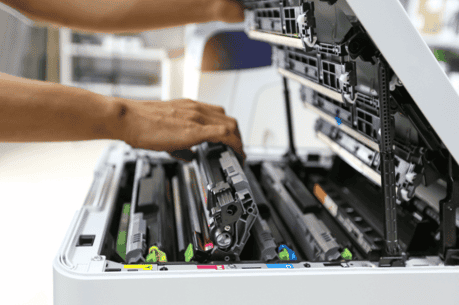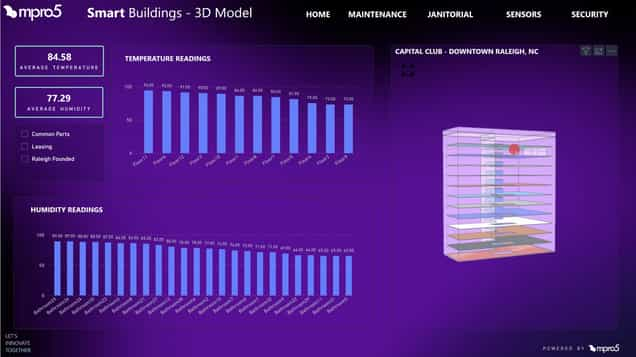What Does Sustainable Facilities Management Look Like?
The work of facilities managers is critical when it comes to realising sustainability in buildings and organisations. Find out what this looks like...
3 min read
 Konnor Baskaran
Sep 25, 2023 2:20:38 PM
Konnor Baskaran
Sep 25, 2023 2:20:38 PM

Discover how facilities management software tackles inflationary challenges, improving efficiency and reducing costs for more resilient operations.
Over the past year, rising inflation has impacted all of us — and the facilities management (FM) industry is no exception. Facilities managers, tasked with controlling costs while maintaining service quality, face unique challenges in this economic climate.
In this guide, we'll explore how inflation affects facilities management professionals and what digital strategies they can use to remain competitive.
Inflation has driven up costs across the board for facilities managers. Labour shortages, rising wages, increased building expenses, and maintenance charges are just a few of the challenges that have emerged.
Here are four critical ways these challenges impact FM:
Managing budgets has become an uphill battle as the prices of raw materials, energy, gas, and water continue to climb. Maintaining the same level of service within budget constraints has become increasingly difficult. Additionally, delays and increased expenses in acquiring maintenance parts further exacerbate the issue.

Effective asset management is a cornerstone of facilities management. Balancing the costs, risks, and benefits of maintaining or replacing assets is always a challenge. Inflation-induced cost pressures often force organisations to prioritise short-term needs over long-term goals, potentially deferring significant risks. Neglecting routine maintenance can lead to decreased asset efficiency and, in some cases, early asset replacements.

The soaring costs of energy have become a substantial financial risk for businesses. Facilities managers are now tasked with scrutinising heating, electricity, and water consumption more closely than ever before. Inflation piles additional pressure on finding energy-saving solutions.
A recent Thomson Reuters report reveals that compliance leaders expect a significant increase in compliance burdens for facilities managers due to evolving regulations and heightened scrutiny. The anticipated increase in compliance burdens and costs will put added pressure on facilities managers to find efficient solutions and maintain financial sustainability in their operations.

Threading the needle as a facilities manager in this economic climate may seem impossible – without sacrificing the level of service or increasing the cost to your customers (and becoming less competitive). But many companies are already using new technology to unlock efficiency, and thus reduce costs while improving service levels.
Ralf Zerenner, MD at Berkeley Services, said in a recent article for FM Middle East:
“FM companies embracing technology now will have a distinct competitive edge, facing up to the major challenges in the way properties are operated and managed… These solutions will undoubtedly support operational efficiencies, staff welfare, and sustainability and will present the biggest opportunities for progressive FM companies.”
mpro5 delivers this competitive edge through simplified compliance, enhanced accuracy, and risk reduction. Automation and IoT-driven scheduling drive innovation and resource optimisation, allowing teams to focus on value-added tasks and quality assessment.
Data visibility is essential for saving money, especially in areas like energy use. mpro5 gives detailed insights and data metrics. This helps facility managers make smart decisions, improve processes, and find ways to save money through data analysis.

mpro5 makes it easier to get work done efficiently. It helps schedule tasks and jobs, automates routine work, and handles unexpected tasks when things go wrong. This mobile-friendly system lets teams communicate in real time, reduce downtime, and work faster.
mpro5 automates daily tasks and processes. This means fewer mistakes, less repetitive work, and less time spent on paperwork. For example, it can automatically handle data entry, generate reports, and assign tasks. This frees up employees to focus on their main tasks while keeping everything consistent.
Our software uses predictions and data from sensors to help maintain equipment and assets. This prevents unexpected breakdowns and keeps things running smoothly. It also extends the life of equipment and reduces costs by avoiding downtime. It's an efficient way to make sure everything works well and saves money.
Despite the formidable challenges posed by inflation, embracing digitalisation and finding the right platform to streamline processes can lead to thriving facilities management operations. Agile operations and automation empower FM companies to deliver excellent service at a competitive price, positioning them ahead of the competition.
For further insights into digitalising facilities management, explore our blog.
We are always available to provide guidance and knowledge on facilities management software solutions tailored to your needs. Contact us today to schedule a call and discover the most effective solutions for your business.

The work of facilities managers is critical when it comes to realising sustainability in buildings and organisations. Find out what this looks like...

The food service industry has been revolutionized in recent years thanks to facilities management software like ours. Read on to find out how...

In recent years, the facilities management sector has experienced significant growth. In this piece, our team of experts explains why. Read on for...